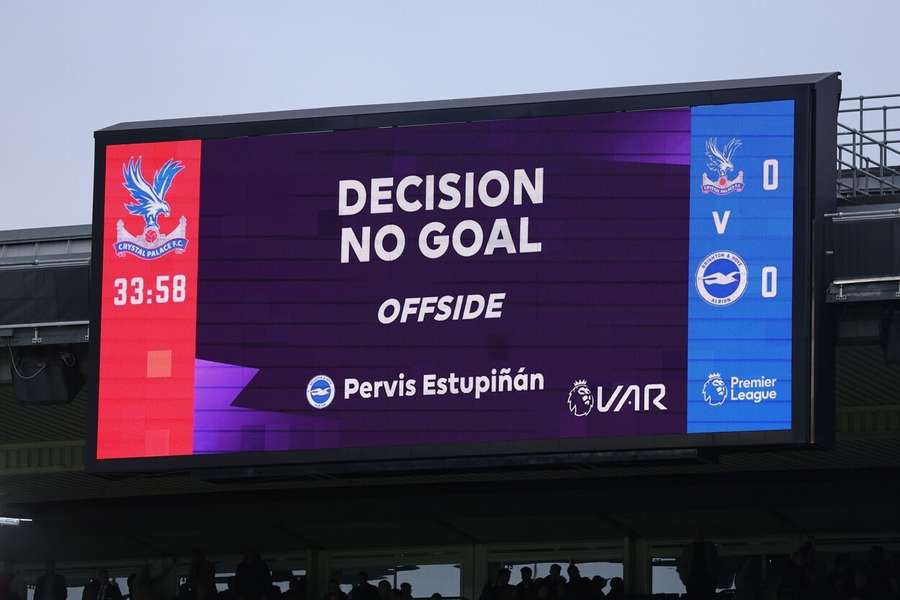By November 2018, clubs in England unanimously voted to include VAR in the Premier League, meaning that the game would change forever at the start of the 2019/20 campaign.
With the introduction of VAR came a number of crucial rule changes, most notably linesmen leaving their flags down until the end of the current phase of play - even if the player was clearly offside (which is a whole other debate in itself with the increased injury risks it brings).
Another major development was the inclusion of the pitch-side monitor that a referee could use to watch back controversial decisions in case the wrong call was made.
VAR was introduced to intervene with potential game-changing errors, allowing for reviews on goals (offsides, fouls, handballs), penalty decisions, direct red card incidents and cases of mistaken identity.
On paper, this all sounds great, and in a lot of cases it has been.
However, particularly in recent weeks, VAR has been surrounded by controversy and a ridiculous number of decisions have gone the wrong way - going completely against the very reasons VAR was voted in five years ago.
Clear and obvious errors
Earlier in February, both Arsenal and Brighton were robbed of precious wins after simply incomprehensible errors from the VAR team.
In Brighton's hotly contested match against Crystal Palace, defender Pervis Estupinan netted what he thought was the opening goal only to be judged to have scored from an offside position.
On closer inspection, it was found that the 'offside lines' (markers used to pinpoint whether or not a player is behind or in front of the last defender) were drawn onto the wrong player and not the last Palace defender.
This meant the goal was wrongly disallowed, despite Estupinan clearly being onside, and the match finished 1-1.
Just when you thought it couldn't get worse, later that same day the VAR in charge of an Arsenal game failed to use the offside lines at all when reviewing Brentford's late equaliser.
Christian Norgaard had strayed into an offside position before setting up Ivan Toney, but the officials forgot to draw the lines on and missed the call completely.
That lead to the match ending in a draw, with the Gunners feeling rightly aggrieved at such a large error taking three points away from them.
The shortcomings of VAR aren't limited to the Premier League either.
During Manchester City's 1-1 draw with RB Leipzig in the Champions League, the ball appeared to strike the arms of defender Benjamin Henrichs in the penalty area, which would have given City a great chance to win the match.
The VAR didn't even check the offence.
Other angles have since emerged suggesting it hit Hendrichs on the shoulder, but viewers weren't informed of this until hours after the match which brings up a whole new point entirely - the fact that supporters are so often left in the dark regarding crucial decisions like this.
These are just a handful of incidents from recent weeks, but the problem has been present for what seems like a long period of time.
The need for change
Naturally, unless a new automatic technology comes in that gets rid of the need for human referees all together, there will always be some form of human error that comes with VAR.
Of course, that is to be expected and it would be unfair to blame referees for minor mistakes - footballers themselves make those almost every game.
However, over the last few months it has moved beyond small errors and we are seeing game-altering mistakes nearly every week. It's clear something has to change.
The first place to start would be the standard of officiating in general - which could improve, particularly in England.
Beyond this, VAR has to be looked at and new measures should be put in place that prevents these major errors from having such an impact on games.
This could start with computer assisted decisions, mainly for offside calls.
For example, in the 2022 World Cup a 'semi-automated offside' technology was used to a fair degree of success in aiding officials when making their decisions.
While it would take some time to implement, it would be a good place to start in eradicating some human error.
In the short-term, putting microphones on referees would benefit both the officials and fans watching.
It would give an insight into the thought process behind key decisions and help supporters understand why certain calls were made - while also likely helping referees deal with disrespect from players on the field.
Something like this would likely be a good step towards changing the officiating in the Premier League.
This has already been trialled at the Club World Cup and looks to be taking a similar path to that of VAR, and it wouldn't be a surprise to see it included over the next few seasons.
Despite all of this appearing beneficial, it almost seems like trying to improve the officiating is a bit of a thankless task - and there will always be those who disagree with the referees and VAR regardless.




